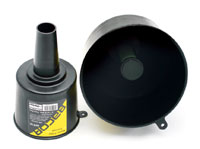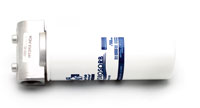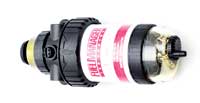Fuel special: why filters are key

Filters aren’t exactly glamorous things. Yet the job they do in holding back nasties of various sorts means they’re essential to the good health of any engine or hydraulic system.
And as farm machinery gets more complex, the role of the filter gets more important. A bit of gunk in your Fergie 35 might have been tolerable in 1965; a similar intruder in your new £60,000 New Holland or Deere could be seriously bad news.
You might reasonably assume that filter technology hasn’t changed much. How complicated, after all, can a piece of elaborately folded paper be? But you couldn’t be more wrong – filter technology is moving forward every bit as fast and confidently as any other component in your tractor, combine or telehandler.
To see how frighteningly complex the world of filters is, you need to drive to a sprawling industrial estate near Ilkeston in Derbyshire. Here you’ll find AB Components’ boss James Edgar (pictured), a man who has spent 20 years in agricultural filters and has a near-encyclopaedic knowledge of all the different types.
What’s striking about filters, he says, is the huge increase in the number of different types you need. “Back in the 1970s the same Crosland 522 fuel filter would fit cars, trucks, tractors and construction equipment,” he says. “Now tractor makers are moving to a different filter for every model.”
It’s no surprise, then, that Mr Edgar reckons he deals with 90 different brands of filter manufacturer and sells more than 6000 different types of filter in any one year.
He says he’s noticed a rise in calls from farmers whose tractor fuel filters have blocked for the first time, especially last winter. Some tractors stopped working simply because the water in the fuel has frozen.
“The problem is that modern tractors have a two-stage filter with a primary using a 30-micron membrane and the secondary using one of just 3 microns,” he says. “I’m a bit worried that filter makers will be blamed for the likely increase in blocked filters once the diesel changes.
“What we need is a filter housing that can be retrofitted to any tank or fuel store, can take different micron filters, takes out water and debris, has an indicator to tell you when it’s full up and comes in different fittings,” he says. “At the moment there’s nothing exactly like that on the market.”
Simple ways to keep your fuel clean
Here are five pieces of equipment that could help – all are sold by AB Components. Incidentally, trying to find individual filter types on the internet can be very frustrating, with manufacturer websites often not listing the one you’re after even though you know it exists. “That’s why farmers come to filtration specialists like me,” says Mr Edgar.
 Racor 149 micron filter funnel is designed as a quick and cheap (£30) way of taking gunk and water out of diesel if you’re filling a tractor or combine tank from a bowser or from a little-used or remote fuel store. It slows the flow, but separates out water and solid particles. The water can then be poured into a separate container and disposed of safely, while the solid matter can be washed out with petrol. A similar product made by www.mrfunnel.com is sold in the UK by Kramp and various other outlets.
Racor 149 micron filter funnel is designed as a quick and cheap (£30) way of taking gunk and water out of diesel if you’re filling a tractor or combine tank from a bowser or from a little-used or remote fuel store. It slows the flow, but separates out water and solid particles. The water can then be poured into a separate container and disposed of safely, while the solid matter can be washed out with petrol. A similar product made by www.mrfunnel.com is sold in the UK by Kramp and various other outlets.
 If you don’t have a filter on your fuel store, this Goldenrod 10 micron unit could be the answer. It fits between the tank and the flexible hose and isn’t complicated to fit. It catches muck and water, with the latter visible and able to be released by a tap at the bottom of the filter bowl. It’s old technology in filter terms, says Mr Edgar, but a heck of a lot better than nothing. Cost is £75 and the replaceable element costs about £10.
If you don’t have a filter on your fuel store, this Goldenrod 10 micron unit could be the answer. It fits between the tank and the flexible hose and isn’t complicated to fit. It catches muck and water, with the latter visible and able to be released by a tap at the bottom of the filter bowl. It’s old technology in filter terms, says Mr Edgar, but a heck of a lot better than nothing. Cost is £75 and the replaceable element costs about £10.
 CimTek Hydrasorb also fits on to fuel tanks and is very effective at absorbing water into the filter. However there’s no tap so no way of knowing when it’s absorbed all it can, says Mr Edgar. It also takes out impurities. Cost is about £100 including the head casting.
CimTek Hydrasorb also fits on to fuel tanks and is very effective at absorbing water into the filter. However there’s no tap so no way of knowing when it’s absorbed all it can, says Mr Edgar. It also takes out impurities. Cost is about £100 including the head casting.
 Racor R90T 10 micron fuel filter has a transparent bowl to see water build-up and a tap to let it drain off. It’s designed to be a replacement for the fuel filters on older tractors which may not allow you to see the water. It’s also a much more effective filter than the replacement ones you might buy for those tractors, which often still use 1970s/1980s filter technology. Cost is about £100 for the whole assembly and elements cost £20/£30.
Racor R90T 10 micron fuel filter has a transparent bowl to see water build-up and a tap to let it drain off. It’s designed to be a replacement for the fuel filters on older tractors which may not allow you to see the water. It’s also a much more effective filter than the replacement ones you might buy for those tractors, which often still use 1970s/1980s filter technology. Cost is about £100 for the whole assembly and elements cost £20/£30.
 Stanadyne Fuel Manager does a similar job to the Racor R90T and is a way of improving fuel filtration on older tractors. The whole assembly typically costs £100 and the elements are £15 to £20.
Stanadyne Fuel Manager does a similar job to the Racor R90T and is a way of improving fuel filtration on older tractors. The whole assembly typically costs £100 and the elements are £15 to £20.
James Edgar’s fuel filter tips
• Don’t try to wash filters out with petrol unless you’re using relatively coarse filters like the Racor filter funnel. It damages the element and lets more gunk past.
• Definitely don’t take an air line to them. It will make holes that will do wonders for fuel flow rate but nothing for the element’s ability to catch nasties.
• Dead filters, used elements and unpleasant water/fuel/rust cocktails are all now classified as hazardous waste and should be kept in a leakproof container and disposed of only in the appropriate container at your local council tip. There, we’ve told you now.

